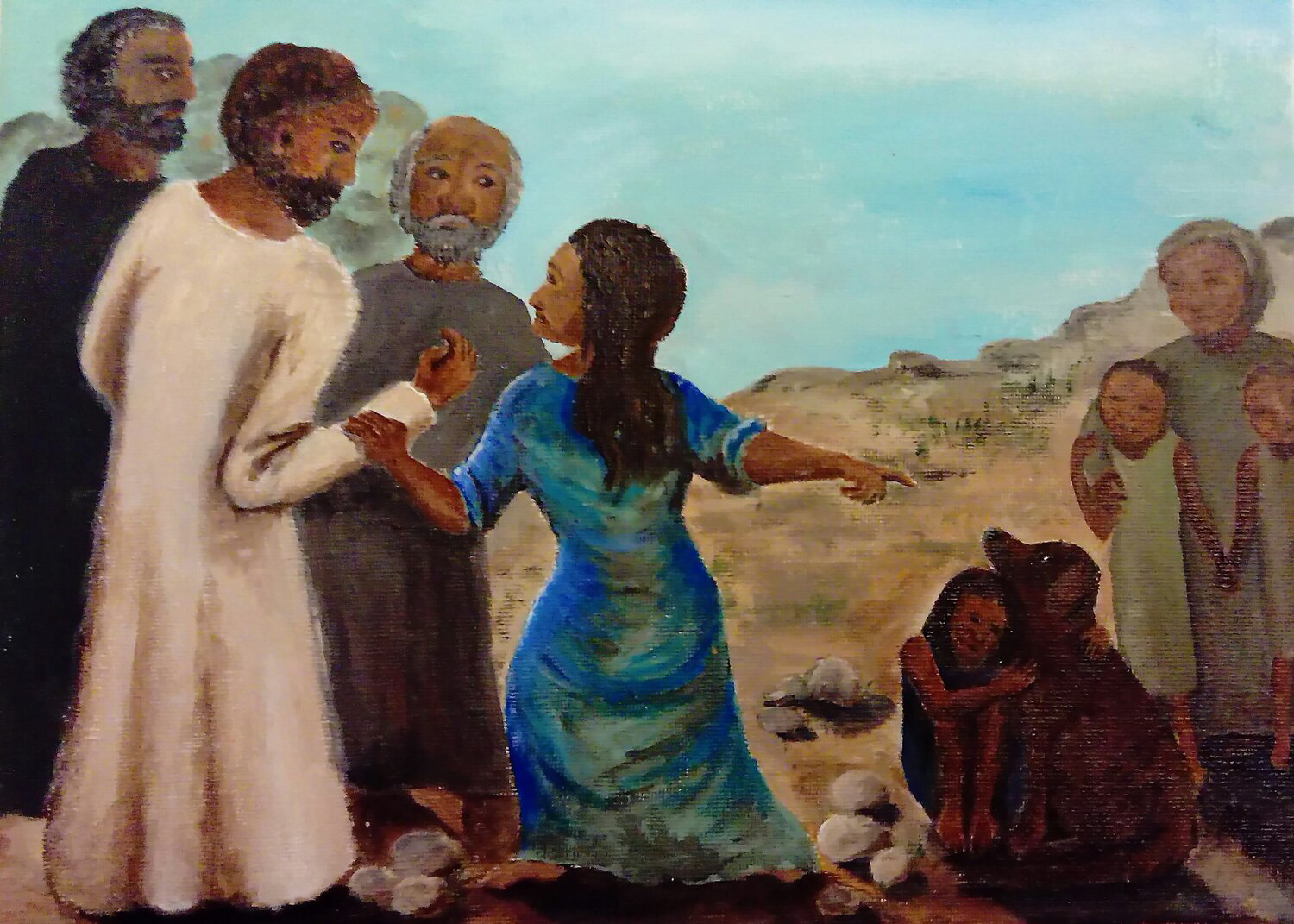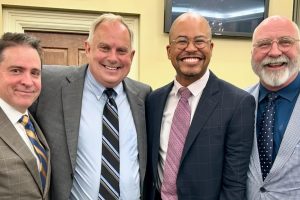It’s a lofty goal, to be sure, but we must continue to learn from Jesus how to approach people as individuals who have their own sacred history.
Today’s social sciences are teaching us about the complexity of each one of us. Race, gender, poverty, lifestyle and other factors are to be considered when we approach someone in the name of Jesus. Where in their world do we begin?

Russell G. Waldrop
We might narrow things a bit by focusing on evangelistic issues in Jesus’ visits with three women we know from Scripture. These are only three among several women who can teach us.
‘Do you see this woman?’ — Luke 7:36-50
It happens at a dinner party in the home of a religious leader named Simon, who has invited Jesus as his guest of honor. Things get tense, though, when an uninvited woman assertively, if not aggressively, opens the door to Simon’s house and interrupts the meal as it is being served.
She is known to everyone there for her, shall we say, “lifestyle.” Whatever the specifics, we can assume she is, indeed, quite sinful; however, she has not come to eat dinner. Something else is on her mind.
Surprisingly, she has a previous relationship with Jesus, one no one around the table knows about, or has to. By now, the mealtime conversations are becoming intense as she puts some finishing touches on her relationship with the honored guest. Moreover, as we say today, she does so “in front of God and everybody.”
Without saying a word, she controls the room with her behavior. Taking her position behind Jesus as he eats, she opens an expensive jar of aromatic alabaster, then opens up her heart for all to see.

Eric Gill (British, 1882–1940), “Mary Magdalen,” 1926. Wood engraving on paper, 6.3 × 6.3 cm. Tate Gallery, London.
Her emotions speak volumes about her love for Jesus. In an outpouring of such emotion, her tears fall on his feet. She catches herself briefly and tries awkwardly to dry them with her long hair, but she succumbs again; now, instead of covering up, she begins to kiss his feet and pour her perfume on them.
Simon, the host, is a man of his time, and possibly of ours. Instead of appreciating her emotional catharsis, he sets up a mental test. “If Jesus is really such a prophet,” he mutters to himself, “he would know all about this woman who is touching him like that, and about her sinful life.”
But Jesus does know this woman and her history, and he welcomes both. His next words must have intrigued, if not shocked, the host and his guests. “Simon,” Jesus says directly to him, “I have something to tell you.”
Instead of complimenting the host, Jesus tells him a parable about love and forgiveness, something this woman already understands so very well. After fussing at Simon for his lack of manners, Jesus announces her forgiveness, apparently more for the others’ benefit than for hers. She knows why she came.
“Then,” the Scripture says, Jesus “turns to the woman and says to Simon, ‘Do you see this woman?’”
That quick turn of Jesus’ head deserves scrutiny. He looks at the woman first, drawing all eyes to her. Then, he looks at Simon and asks him if he sees her, notices her, is paying attention to her. Of course, he isn’t and hasn’t been all evening. He has been watching Jesus too much.
Can we imagine a pastor saying today: “Church, we’ve been paying too much attention to Jesus and not enough to this woman’s tearful, worshipful example of discipleship?”
But that is what Jesus did. He de-emphasized himself and emphasized her in calling his followers to recognize and celebrate this woman’s way of knowing how to follow him.
She knew what no one there knew, except the guest of honor. He knew her.
We must note the conclusion. Looking directly at this woman he told her: “Your faith has saved you; go in peace.”
End of story?
Well, no. Jesus’ closing praise of her faith is quite a sendoff. He makes no claim to it. Why not say, “Your faith in God …” or, “Your faith in me has saved you”?
As with others who received this same benediction, Jesus recognizes her part of their relationship. He was there for her previously when she had “latched onto” him with all of her being. That was her part.
And he was faithful to her in his part, allowing himself to be “latched onto” by a very assertive woman.
He welcomed and received her.
Jesus and ‘intersectionality’ — John 4:7-42
The next woman to “see” involves intersectionality, a social concept where a person experiences an “intersection” of two or more difficult life conditions simultaneously.
An example would be a woman from a racial and religious minority group who lives with marital or sexual stigmas in a culture of powerful gender imbalances, where she is emotionally distant from people around her.

“Woman at the Well,” He Qi
Jesus visited such a woman whom we likely know as “the woman at the well.” Their conversation may teach us something about evangelism.
Consider these living “intersections” in her daily life. She experiences: (a) longstanding racism, (b) irreconcilable religious differences, (c) a powerful gender imbalance, (d) marital-sexual stigmas, (e) emotional distancing and, (f) the weight of all these together.
What can pastors, deacons, evangelists and laity learn from Jesus about how to better care for people living in the “intersectionalities” of their lives?
Jesus responds to the weight of these barriers by initiating a conversation about a common need they have. He, like her, was thirsty. Yet, even this was risky and it brings out her sarcasm, “Did you lose your bucket?” (as she might say to him today).
Then, she stereotyped Jesus as a typical Jewish man talking to her, a Samaritan woman stereotyped by virtually everyone. Can we accept the stereotyping of those we visit in order to “evangelize” or, do we try so hard not to be that way that we prove we are exactly that way?
His disciples were speechless as Jesus stood with a woman in all these intersections of her life. How do we react when bystanders are stunned at our walking into such intersections in people’s lives?
Moreover, she implies that Jesus is grandiose for acting like the ancient Jacob who built the well. Rather than becoming defensive and correcting her stereotype, he shows he is outside of it, far beyond it. Can we function helpfully when all the common stereotypes of being “followers of Jesus” are thrown at us?
Hopefully, the church today is learning that we cannot break through intersectional resistance by using well-rehearsed dialogue or pamphlets that provide emotional protection from rejection or failure.
Jesus’ willingness to move slowly from asking for a drink of water to asking about her husband led to her forgetting her own water bucket as she ran excitedly to tell her hometown about “the man who told me everything I have ever done,” thus helping her community to experience Jesus.
“The evangelistic tool here was a drink of water with a woman in the crisis of her many intersections.”
The evangelistic tool here was a drink of water with a woman in the crisis of her many intersections.
As pastors, deacons, evangelists and others representing Christ to people in the many intersections of their lives, how are we doing with our own intersections?
Intersectionality is one of those social science terms that can help us understand other people better and how to relate to them. It also might help us better understand ourselves as representatives of Jesus.

“The One with the Crumby Dog” by Ally Barrett.
A woman helps Jesus change — Matthew 15:21-28
The third of several women available in the Gospels for us to “see” is as nameless as the first two. Her story is about a woman who knows what she wants and goes to get it.
All faithful followers of Jesus have felt stumped at times in our evangelistic efforts. Whether it was a sharply pointed question about theology or a newly discovered political implication for discipleship, we have had to stop — sometimes dead in our tracks — and wait for more information before answering them. Silence may be the path for us, too, through which God speaks about such matters.
In a way, Jesus “met his match” in this woman who would not take “no” for an answer. Her plea for mercy for her dreadfully ill daughter left him silent. His disciples seized the opportunity to pull him away from her by shouting: “Send her away!” They were bothered by her aggressive and persistent “noise.”
It seemed for a moment that he might do just that, especially when he broke his silence and affirmed his ministry was only to the “lost sheep of the people of Israel.”
When she fell at his feet and said simply: “Help me, sir,” Jesus still did not relent and replied instead with a parable of rejection, comparing the people of Israel to God’s children and her to one of their “dogs.”
Again, though, she persists, even seeming to accept the encultured and discriminatory categories Jesus had been taught from childhood. How could he back down now from this non-Jewish woman who was no longer “in his face,” but lying down at his feet, pleading: “Help me, sir” on behalf of her dying daughter?
“Jesus remains bound to his country’s prejudices.”
Jesus remains bound to his country’s prejudices. However, this woman responds again from within those false categories, apparently accepting her lower place in society, but now claiming that even “dogs” get fed from the leftovers of the children of God.
Now, Jesus is touched, actually moved, by such faith. He finally acts in her favor and heals her daughter, breaking with centuries of tradition and expanding his ministry to include the whole world. In other words, Jesus changed.
We like to think of Jesus as unruffled, unperturbed, always confident, never defeated in debate, and probably free of mistakes because he was sinless.
Yet, how does anyone change without being challenged — by teachers, coaches, parents, friends and others who encourage us, even hound us, to do so?
Jesus’ birth narrative tells us of his need to “grow and become strong” and that he “grew both in body and in wisdom.” This was seen in the temple when, at the age of 12, he amazed his elders and instructors with a growing wisdom and an independent streak that irritated his parents when he “got lost” from them.
If we can see Jesus as a child, learning from Joseph how to hammer nails, do we think he never hit his thumb, or always made A+ in school, never misprinting even the jots and tittles of the Hebrew language?
So, Jesus learned his lesson from an aggressive woman who kept after him until he paused, stood still and listened to the voice of God speaking to him through her.
This was a monumental turning point in history, one Jesus initially refused.
To borrow a phrase that has become a motto among modern women: “Nevertheless, she persisted.”
Like Jesus, will the church help her prevail?
Russell Waldrop is a retired chaplain and pastoral counselor and is vice president of the Waynesboro, Va., branch of the NAACP.








































































